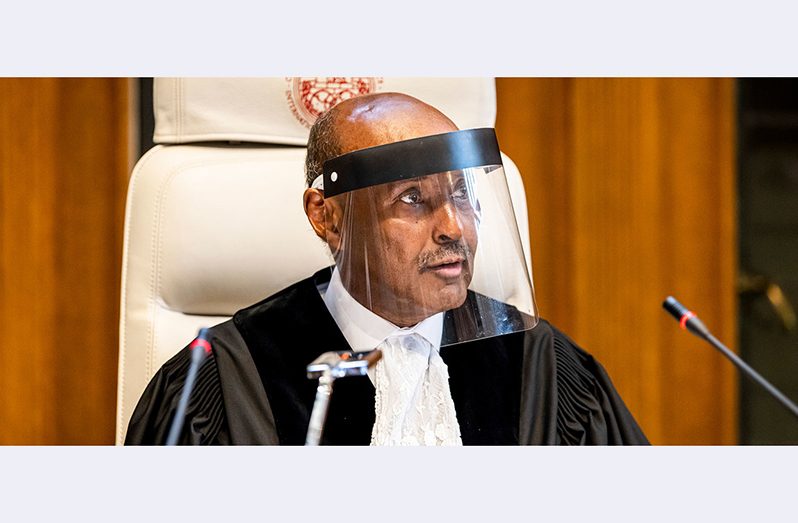— to hear case on Guyana, Venezuela border controversy
THE International Court of Justice (ICJ) on Friday ruled that it has jurisdiction to hear the Guyana, Venezuela border controversy case.
The judgement was delivered by President of the ICJ, Judge Abdulqawi Ahmed Yusuf, at a public sitting at the Peace Palace in the Hague, Netherland, which by a 12-4 majority ruled that it has jurisdiction to entertain Guyana’s claims.
The claims concern the validity of the 1899 Award about the frontier between the two countries and the related question of the definitive settlement of the land boundary controversy between the territories of the parties.
In the judgment read out by ICJ President, it was noted that Guyana and Venezuela conferred upon the Secretary-General of the United Nations, António Guterres, the authority to choose the means of settlement of the controversy and, on 30 January 2018, the Secretary-General exercised his authority by choosing judicial settlement by the ICJ.
By virtue of Article IV, paragraph 2, of the Geneva Agreement, the parties accepted the possibility of the controversy being resolved by means of judicial settlement, the ICJ President said as he went on to say that the court is the “principal judicial organ of the United Nations”.
The Court observed that the fact that the Secretary-General invited Guyana and Venezuela, if they so wished, “to attempt to resolve the controversy through direct negotiations, in parallel to a judicial process” and his offer of good offices to that end did not affect the conformity of the decision with Article IV, paragraph 2, of the Geneva Agreement.
The Court had explained in the past that parallel attempts at settlement of a controversy by diplomatic means do not prevent it from being dealt with by the court. In the present case, the Secretary-General simply reminded the parties that negotiations were a means of the settlement that remained available to them while the controversy was pending before the court.
Moreover, the circumstances surrounding the conclusion of the Geneva Agreement, which include ministerial statements and parliamentary debates indicate that recourse to the ICJ was contemplated by both parties during their negotiations.
To this backdrop, the ICJ President, in his ruling, also highlighted the decision taken by Venezuela not to participate in the court proceedings.
REGRET
“The court wishes to first of all express its regret at the decision taken by Venezuela not to participate in the proceedings before it… In this regard, it recalls that, under Article 53 of its Statute, “whenever one of the parties does not appear before the Court, or fails to defend its case, the other party may call upon the Court to decide in favour of its claim” and that “the Court must, before doing so, satisfy itself, not only that it has jurisdiction in accordance with Articles 36 and 37, but also that the claim is well-founded in fact and law,” he added.
The ICJ judge stressed that the non-appearance of a party obviously had a negative impact on the sound administration of justice. In particular, the non-appearing party forfeits the opportunity to submit evidence and arguments in support of its own case and to counter the allegations of its opponent. For this reason, the court did not have the assistance it might have derived from this information.
In closing, the court said conferring on the Secretary-General the authority to choose the appropriate means of settlement of their controversy, including the possibility of recourse to judicial settlement by the International Court of Justice, Guyana and Venezuela, consented to its jurisdiction.
“The text, the object and purpose of the Geneva Agreement, as well as the circumstances surrounding its conclusion, support this finding. It follows that the consent of the parties to the jurisdiction of the court is established in the circumstances of this case,” the ICJ President said.
WAY PAVED FOR SUBSTANTIVE MATTER
This ruling now paves the way for the World Court to hear the arguments in the substantive matter regarding the validity of the 1899 Arbitral Award which sets out the boundary between the two countries. The Government of Guyana was represented at these hearings by David Hales, Ambassador of Guyana to Belgium and non-resident Ambassador to the Netherlands and Lloyd Gunraj, First Secretary, Embassy of Guyana, Brussels.
In March 2018, Guyana filed its application in the ICJ seeking an affirmation of the validity of the1899 Arbitral Award and the international boundary that it established.
On June 30, Guyana, in its virtual presentation in the Arbitral Award of October 1899 (Guyana v. Venezuela) case said that, not only is Venezuela’s current interpretation of the Geneva Agreement illogical and erroneous, but it is in stark contrast to the interpretation the Spanish-speaking country had when it signed the very agreement in February 1966. Represented by a battery of international lawyers, Guyana said the agreement, in unambiguous terms, empowered the United Nations (UN) Secretary-General to determine an appropriate resolution mechanism to enable a peaceful settlement, which is the ICJ.
Distinguished Guyanese Diplomat and Co-Agent, Sir Shridath Ramphal, who had led the arguments before the ICJ said the case was significant to the people of Guyana, who are united in defence of their sovereignty and territorial integrity of their homeland.
Guyana is seeking to obtain a final and binding judgement that the 1899 Arbitral Award, which established the location of the land boundary between then British Guiana and Venezuela, remains valid, and that the Essequibo region belongs to Guyana, and not Venezuela.



.jpg)











